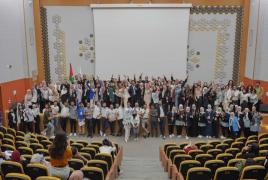العلاقات العامة والدولية – جامعة الإسراء
نشر الدكتور أحمد الصليبي من كلية نظم المعلومات في جامعة الإسراء، بحثاً مشتركاً بعنوان
"Modified Global Flower Pollination Algorithm and its Application for Optimization
Problems" بالتعاون مع كلية علوم الحاسوب في جامعة بيرزيت ومركز الحج والعمرة التابع لجامعة أم القرى في مجلة
"Journal: Interdisciplinary Sciences: Computational Life Sciences" ذات معامل تأثير "Impact Factor: 0.753" التابعة لدار النشر العالمية."Publisher: Springer".
وجاء ملخص البحث في مجال الذكاء الاصطناعي، في حين اجتذبت خواريزمية"Pollination Flower Global "إهتمام الباحثين مؤخرا. ویرجع ذلك لكفاءة الخواريزيمة في البحث عن الحل الأمثل والأكثر فعالية للمشاكل التي تقوم بحلها.
وسعى الباحثون في هذه الورقة البحثية إلي تطوير الخوارزمية وذلك بطرح خواريزمية جديدة معدلة اطلق عليها اسم." modified global FPA (mgFPA)".
وتم تطوير الخواريزمية المقترحة بالإعتماد على الإستغلال الأمثل للحلول المتوفرةعن طريق إستكشاف خصائصها، وجرى التحقق من فعالية الخواريزمية المقترحة عن طريق تطبيقها على مجموعة من المسائل المتعلقة بالتطوير والتحسين.
الخواريزمية المقترحة قدمت نتائج مرضيه بالمقارنة مع الخواريزميات الأخرى عند تطبيقها لإيجاد حلول لنفس
المسائل.
Flower Pollination Algorithm (FPA) has increasingly attracted researchers’ attention in the computational
intelligence field. This is due to its simplicity and efficiency in searching for global optimality of many
optimization problems. However, there is a possibility to enhance its search performance further. This
paper aspires to develop a new FPA variant that aims to improve the convergence rate and solution
quality, which will be called modified global FPA (mgFPA). The mgFPA is designed to better utilize
features of existing solutions through extracting its characteristics, and direct the exploration process
towards specific search areas. Several continuous optimization problems were used to investigate the
positive impact of the proposed algorithm. The eligibility of mgFPA was also validated on real
optimization problems, where it trains artificial neural networks to perform pattern classification.
Computational results show that the proposed algorithm provides satisfactory performance in terms of
finding better solutions compared to six state-of-the-art optimization algorithms that had been used for
benchmarking.











